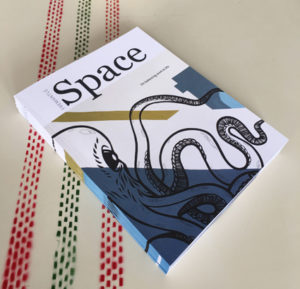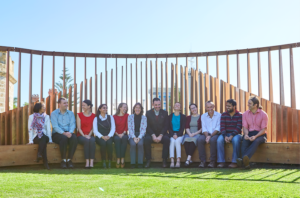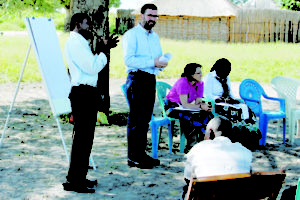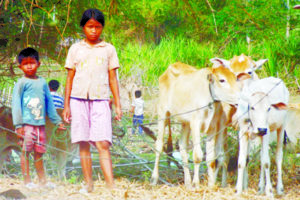fSpace Magazine – In Case of World Health Problems, Please Call
_The following is from FREMANTLE Space, the_ fSpace magazine which celebrates the people who have embraced the ethos of small coworking space in the heart of Fremantle.
By Alexei Tsallis
It’s 9:05 am. You’ve just spent an hour in bumper-to-bumper traffic on your way to work in the CBD. You’re late for a meeting. You speed walk through the foyer past strangers who don’t make eye contact. You scan emails on your phone as you wait for an elevator. You push forward into an empty carriage before the ding announcing its arrival fades. You stare ahead, your thoughts alternating between your meeting and why the damn lift won’t go faster. Finally, the doors open to your floor, but your freedom from containment is short-lived as you sit in your small office. Rapidly pulling some papers together, you glance at a quote you printed on your first day: “You have to be the change you want to see in the world.” You cringe, knowing that yesterday was the same, and that tomorrow will be no different.
THAT is the type of workspace that the coolest company you’ve likely never heard of wanted to avoid. Fremantle-based Ausvet, a team of consultant epidemiologists, is the company which get calls from governments all over the world to explain the science of diseases and to discover solutions. I sat down with founder Dr Ben Madin to find out what Ausvet has been up to since they left fSpace, and also what they actually do.
“Global health is not about separate beings. It is the interrelation of all animals, humans, fish and plants. When one fails, so do the others.”
Many things can cause a disease: bacteria, a virus, a toxin and a nutritional deficit are just some examples. When Ausvet is called on to consult on a situation, the company takes everything into account. Says Ben, “Epidemiology strictly means the study of disease across (epi) people (demos), but in our world it really means the relationship between the affected person, animal or plant, the environment they are in and the agent that is causing the disease.” There is often a crossover as agriculture problems affect humans, which is why Ausvet is increasingly doing more plant work. “Most diseases in the world affect more than just one species.” Ben begins to laugh while adding, “And humans, whether we like to believe it or not, are just one of those species.”
When an industry has a problem or a disease within their production, Ben and his team look at all the potential factors. “Other than doing laboratory work or pathology work, we are asked to come out and look at the bigger picture.” A lot of the work he does involves comparing and contrasting healthy properties with unhealthy ones. “Sometimes it’s a difference within a person or animal and sometimes it’s a difference within the environment in which they live.”
Ausvet also deals with human diseases. One such example is Goitre, a thyroid disease that is mainly caused by an iodine deficiency. The disease had not been an issue in Australia since salt was iodised, but Ausvet was brought in to investigate a resurgence. They discovered several reasons for its return, including the fact that much of the iodised salt in our diet has been replaced with rock salt and sea salt over the last thirty years. This loss of iodine consumption contributed to an emergence of the disease not seen since 1930.
With six epidemiologists working from their homes around Australia, it wasn’t until 2014 that the business decided to add a fulltime employee. That’s when Ausvet joined fSpace to have, as Ben puts it, “A workspace that wasn’t just my kitchen table.” Growth took off and it was little more than a year later that Ben decided he needed to employ more people in WA and would need a larger space of their own. “We now have 10 people in Western Australia and 30 people globally, with key offices here and in Canberra, and a growing presence in France.” His team mostly travels to their clients to conduct investigations and collect data, but they occasionally stay longer (up to 7 months!) to implement solutions.
Although growth continues to be a goal, Ben doesn’t want Ausvet to become a massive corporation. “We’d like to have a staff of maybe 60 to 70 across three or four offices, so we’re about halfway there.” Ben wants enough in-house people with different backgrounds to develop a unique solution to each problem, while still contracting relevant specialists.
Through diagnostic work and subsequent trials, Ausvet is often involved in making significant changes to processes and policies in both business and industry. Focusing on research and solutions that can make a difference, Ausvet’s final reports include practical policy options so that changes can actually be implemented.
They strive not only to solve problems but to inspire the owners of the problems to manage them, regardless of whether the problems are found on a farm, in an industry, even a country. This affirms the value that Ausvet places on sustainability and why they always keep the big picture at the forefront. They are particularly pleased that after working in Indonesia to develop a national animal and public health system, it is now fully managed by Indonesia, receiving thousands of individual messages a day from across the archipelago.
“Change is useless if we cannot empower people to manage it themselves.”
Ben’s team can collect an incredibly high volume of data during their research. Dealing with upward of three million samples a day, they translate the data into workable information so that the right decisions can be made. “We used to think our clients wanted more data, but actually they want us to translate ‘data’ into ‘information’ so they can make evidence based decisions.”
Ausvet reinforces their community ideology by creating solutions that actually work in practice, not just in theory. Making a difference to the health of a community is not just an aspiration; it is a prerequisite of their work.
“We don’t want to be just another cog in the wheel.”
Our planet is one huge eco-system. The impact of humans on this ecosystem is undeniable, and we expect to see new diseases emerging continuously. Ben, although optimistic, realises that Ausvet can’t change everything. “We are not trying to solve all the world’s problems, but we feel very strongly that we can have an impact in some way.” Ben’s team is actively trying to change perceptions of those in power that there will be a single silver bullet solution, and those who treat the symptom instead of dealing with the often-complex causes of the problem.
Ben believes a workspace can have major impacts on lifestyle and happiness, as well as on the focus and determination of a staff. Ben also believes that just walking around your area can remind you of what is important in life, adding “If you just drive your car into a basement of the office you work in, you’re not engaging with your community very much.” This engagement with community and sense of purpose are cornerstones of his business philosophy.
Ben’s time at fSpace influenced him to engage with others, which in turn became an important aspect of his business. When Ausvet moved into its own space, Ben focused on creating an environment that would inspire his team more than a paycheque. By treating them as members of a community rather than reinforcing a hierarchy, Ausvet is more focused on solving problems than running a traditional business.
According to Ben, basing their operations in Fremantle is “probably a mix of pure practicality and slight idealism.” Ausvet wanted to avoid the congestion of the Perth CBD while remaining connected to public transport to limit their use of personal vehicles. Heavily involved within the agriculture and aquaculture industries, they are close to Murdoch University and the hospitals with which they work. Fremantle’s port city artistic heritage also provides a beautiful scenic place to walk around with ample options for lunch and coffee; all of which contribute to the revitalisation of spirit and focus.
Ben’s vision for the future includes a public understanding that health problems are multifactorial and there is rarely just one cause. The reality of the agriculture industry is that many of the health problems Ausvet solves are economically caused. For instance, giving more space to animals such as chickens and pigs would help to reduce some problems, however the costs of such changes are often more than consumers are prepared to pay. Ben believes in a healthy equilibrium: “Consumers need to realise that environmental balance has a cost. If they want it, they have to be willing to pay more.”
“Will it work out in the future?”
My final question hung in the air between us and Ben thought about it for a moment. “Humans are where we are today because we managed to solve all the problems that have been put in front of us so far. I have enormous faith that humans can solve these problems. My only real concern is that people seem to be increasingly focused on ‘What is in it for me?’ and not in _‘What is in it for the broader society?’_”
With a vision of ‘one world, one health’, Ben and Ausvet will continue to do what they can to solve health problems and encourage decisions that lead to a healthier and more sustainable planet.



